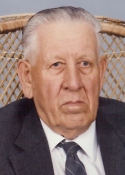
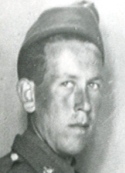 Myron George Kimber was born in a dirt-roofed log house in Grouse Creek, Box Elder County, Utah on January 13, 1917, the fourth of the five sons of Charles William Kimber and Agnes Malinda Jones Kimber. There were no daughters in the family. Each of the boys grew up knowing the meaning of hard work and sacrifice so typical of the times. The family was plagued with many setbacks in their struggles to make a living and keep food on the table.
Myron George Kimber was born in a dirt-roofed log house in Grouse Creek, Box Elder County, Utah on January 13, 1917, the fourth of the five sons of Charles William Kimber and Agnes Malinda Jones Kimber. There were no daughters in the family. Each of the boys grew up knowing the meaning of hard work and sacrifice so typical of the times. The family was plagued with many setbacks in their struggles to make a living and keep food on the table.
Finally, because of the deteriorating health of Myron’s father, the farm was leased out, and the family moved to Ogden. During this time, Myron attended the schools there. In high school, he sang with the Ogden High School a Capella choir which performed at various schools and on special occasions in the area. Several other students from Grouse Creek also sang in the choir.
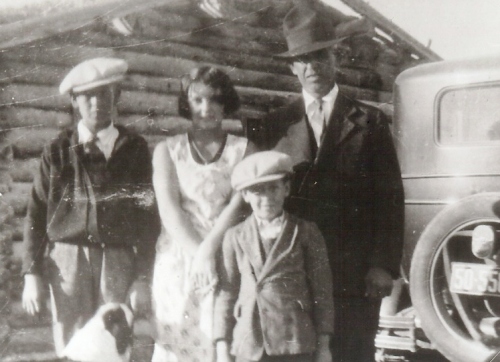
Myron Kimber, Midred Toyn. Russe lKimber & Charles William Kimber
Myron cannot remember of a time when his father enjoyed the best of health. Most of his memories are of a father suffering and crippled with arthritis and other debilitating diseases. The three older brothers had married and were living in Ogden when the rest of the family returned to Grouse Creek. Myron and Russell then had the main responsibility of taking care of the farm.
Early each spring, Myron worked with the shearing crews who went to various places in northern Utah and Nevada to shear sheep. Most of the time, he tied fleeces and then would “stomp” the fleeces down into the big wool sacks to be shipped to buyers. In the summer times, he went with the hay crews to the big ranches in northeastern Nevada. Using their own horses and equipment, they would spend five or six weeks taking care of the meadow hay for the Utah Construction Company. These crews were made up mainly of Grouse Creek men, organized and supervised by two of Myron’s uncles, Oz and Elmer Kimber (also George Paskett). He worked with their shearing crews and on the Vineyard and 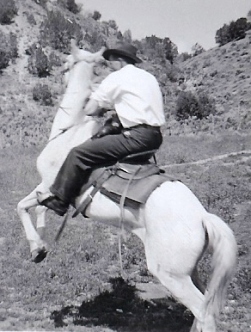 HD ranches with them.
HD ranches with them.
Each fall, for several years, Myron, along with some of the other Grouse Creek boys went to Idaho to help harvest beets and potatoes for Wilford Richins. During several winters when he was in his late teens, he fed cattle for various ranchers. Often he would be by himself for weeks at a time. For a while he worked on a crew for the Southern Pacific Railroad, with other young men from Grouse Creek, laying and repairing the rails in northern Nevada and parts of California. It was very hard work. He received his Social Security card while working for the railroad. These jobs paid only minimal wages, but he was frugal with his money and was a great help to his parents. He bought his mother her first gasoline washing machine and her first set of nice dishes. He also bought his folks their first battery-operated radio.
He was working on the McCustion ranch south of Montello, Nevada, when he received his draft notice and was inducted into the Army in early 1941. He was assigned to Company C of the 53rd Infantry and was sent to Ford Ord, California for training. After about five or six months, because of his father’s critical health condition, he was given an agricultural deferment and he returned to help run the farm. He later learned that Company C of the 53rd Infantry had been sent to the Aleutian Islands, and all but a few had been killed in one of the battles in that area.
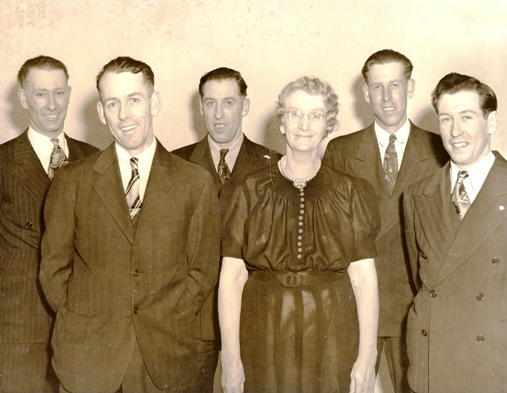
Evan, Eldred, Vaughn, Agnes Malinda, Myron & Russell Kimber
Myron’s father died in November 1941. Because of the desperate need of money, Myron secured work as a truck driver at the Army Supply Depot at Second Street in Ogden. There was the farm loan payments to make and his father’s funeral expenses to pay.
On June 24, 1942, he and LaVerne Lee were married in the Salt Lake Temple. She had returned from her employment in Washington, D.C. in December 1941 (afterPearl Harbor) and had begun working at Hill Field near Ogden. They continued to live in Ogden only a few months and then moved back to the farm in Grouse Creek. They lived with his mother in the three-room dirt-roofed house. Their entire earnings for that first year back on the farm amounted to less than $500.00. Their sons, Eugene and Michael were born while they lived here, LaVerne going to Ogden for each confinement.
After World War II ended, Russell (who had been drafted after Myron was deferred) returned from active service, and Myron moved with his family to Wendover, Utah, where he had found employment at the air base there. However, he soon went to work at the Western Garage and from there to a nearby potash plant. Two more sons, Gary and Kenneth, were born to them. Russell and his mother moved to Wendover also, having leased out the farm. It was later sold to Oz and Grant Kimber. After a year or two, Myron and Russell leased the UTOCO service station and began purchasing the adjoining garage. Long, hard hours, sometimes becoming twenty-four hour working days were demanded, and Myron developed stomach ulcers. It was decided that another move had to be made.
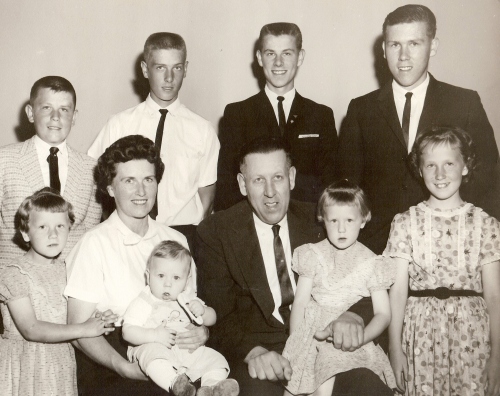
BR-Kenneth, Gary, Michael, Eugene FR-Debra, LaVerne, Don, Myron, Diane & Margaret Kimber
The family moved to Grantsville, Utah in 1951. Myron worked for a short time at the Tooele Ordnance Depot before hiring out at the salt plant near Lakepoint. He worked there several years and then took employment with Western Phosphate near Magna, being one of the first five employees hired after that plant began its operations. After a few more years, he was persuaded to go to work for Hercules Incorporated at Bacchus. Hercules had government contracts to build ballistic missiles, the Poseidon and Polaris for the Navy and the Minuteman for the Army. For twenty-two years, Myron worked for Hercules, most of that time as foreman of the electric shop. He also taught classes in basic electricity for Utah Technical College for several quarters. He was never fired from a job and never quit a job unless he had a better one to go to the next working day. He retired on September 1, 1981.
After their move to Grantsville, the family was joined during the ensuing years by Margaret, Debra, Diane and Don, making a total of five sons and three daughters for Myron and LaVerne.
During those working years mentioned above, the family built their own home on Race Street. Purchasing surplus ammunition boxes at Tooele Ordnance Depot, plus buying and tearing down an unused shower building in Wendover, plus securing used but good lumber salvaged from the burned Cullen Hotel in Salt Lake, plus other money-saving strategies, the family succeeded in building a modest but comfortable three bedroom home. Myron did most of the work, but family and friends were also generous with their time and labor. The family moved in (when it was still unfinished) in September of 1956. Much family history has transpired in this home and it is still the center of many family activities.
Myron has always been active in the Church. As a deacon and a scout in the Ogden 13th Ward, he had many associations with S. Dilworth Young who was at that time in charge of scouting in the Ogden area and who later became a General Authority of the Church. Myron always enjoyed singing in choirs, both ward and stake, the first being the Grouse Creek ward choir. He served there in the YMMIA and was also a scoutmaster for a while. During their five years in Wendover, he served in the Elder’s quorum and the Sunday School, and for three years was second counselor to Bishop J. Ronald Anderson.
In Grantsville, Myron served at various times as, a teacher in various quorum and Sunday School classes, ward and stake YMMIA president, assistant in Stake Sunday School presidency, high priests’ group leader, a chorister in the 2nd Ward and also for stake priesthood meetings, bishop of the Grantsville 2nd Ward for four years, and finance clerk for six successive bishops of that ward. At one time he had the rare experience of leading the music in a stake priesthood meeting as Elder Spencer W. Kimball accompanied. For a year and a half, with his wife, he served once a week in the Church Membership Department in Salt Lake City. Also, for two years, they served on Wednesdays as sealing proxies in the Salt Lake Temple. Since May 1989, they have been ordinance workers in the Salt Lake Temple, serving two shifts per week, (with the exception of about a year and a half when Myron underwent several surgeries). One son served four years in the Air Force, and three sons served missions for the Church. Myron has conducted and spoken at many funerals. In former years, he sang many solos and also sang in duets and quartets as well as choirs. He has attended sessions in at least seven temples. He has been a home teacher for many years.
He has met and become acquainted with many church leaders including S. Dilworth Young, LeGrande Richards, Harold B. Lee, J. Rueben Clark Jr., Spencer W. Kimball, Cleon Skousen, Dan Rona, Henry Eyring, and other church leaders who have attended the temple during his time of service there.
He has served also in civic capacities. He was an umpire in Grantsville Boys’ Little League for more than ten years. He served on the Grantsville City Council for two years. He was an officer in the Grantsville Federal Credit Union for more than twenty-five years, most of that time as its president, all of those years without pay. He and his wife raise a big garden each summer and share it with many of their friends and family.
Thanks mostly to his son Michael who has worked many years for the airlines, and also to his daughter Margaret and husband (a military family), he has traveled quite extensively. He has been in at least a dozen states of the continental U.S., as well as Alaska and Hawaii. He has also visited Mexico, Belgium, France, England, Holland and Israel, all in company with his wife, and often with other family members as well.
During his lifetime, he has built up quite a medical history. At seven years of age, his tonsils were removed, the operations being performed on the dining room table at the Barlow home in Grouse Creek by a doctor (Dr. Leonard), who came to the community once a year. Also, in his youth he had an appendectomy and a broken arm. In later live he developed bleeding ulcers and still later had prostate cancer, four total hip replacements (three on the left side), he suffered through a heart attack followed by heart surgery, and also had a total knee replacement.
His greatest pride is his family. Each of the children know their father as a confidante and dependable helper who willingly shares his time, talents and tools. They know him to be a hard worker and a good neighbor. Each of them know, without a doubt, that he has a strong testimony of the Gospel of Jesus Christ. And each of them have special memories of the many things he has done for them and for the fatherly advice he has given to them. At this time (1996) his posterity includes his eight children and their spouses, thirty-two grandchildren and eleven great-grandchildren.
Myron George Kimber, our beloved father, grandfather, and brother, passed away peacefully on September 5, 2008.
